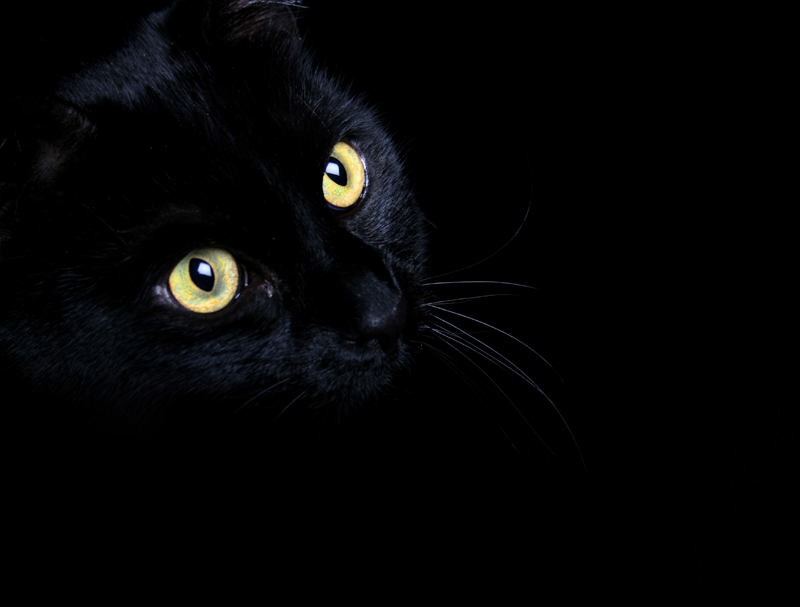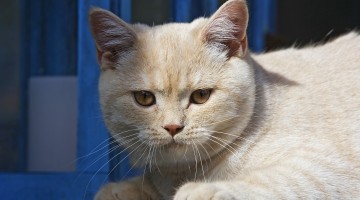For centuries, cats have been a source of superstition. Here’s a look at some of the weird and wacky beliefs surrounding our feline friends.
Think Halloween and one of the first images that comes to mind is a black cat. Along with witches and Jack o’lanterns, black felines with arched backs and glowing eyes are synonymous with this late autumn holiday. And it doesn’t stop there. Cats of all colors have been connected with myth, legend and superstition for almost as long as they’ve shared their lives with humans. When and why did it all start?
Is it the eyes?
It’s hard to ignore a cat. Felines have a strange air of mystery and superiority about them, and their eyes seem to shine with an unearthly fire in the dark. Perhaps it’s their eyes that have captured people’s imaginations down through the ages, although there is nothing superstitious about why they seem to glow at night.
A cat’s eyes have a light-reflecting layer that sits behind the retina. This layer acts as a mirror and causes the eyes to shine. The first guy who really discovered this was Percy Shaw in 1934 – he subsequently made millions by copying the idea and coming up with the reflective “cat’s eyes” that serve as night-time safety markers on roads today.
Another unique feature of the feline eye is the vertical pupil, which can open far wider than the human one. Is it any wonder cats see so well in the dark, or that so much folklore and mythology has grown up around them?
Strange beliefs
Early Americans had their own cat superstitions. One of the more horrible ones believed by some colonists is that a broth made from boiling a black cat would cure tuberculosis – although killing the animal in the first place would bring the cook bad luck. Another early superstition involved putting a cat in through the window rather than the door of a new home before the family moved in – that way, it was believed, the cat would never leave.
Here are some more fun and unusual feline superstitions:
- A cat sneezing in your presence is a sign of good luck.
- Dreaming of a cat is said to be a sign of bad luck, yet American folklore says that if the cat is white, you’ll have good luck.
- Ancient myth contends that cats have a great influence on the weather. Witches were thought to ride storms along with their cats, while dogs, as attendants of the storm king Odin, symbolized the wind. This could be where the phrase “raining cats and dogs” originated.
- In ancient times, a criminal would sometimes have his tongue cut out and fed to the feline companions of the judges. This is where “cat got your tongue?” came from.
- In darkness, cats are masters of stealth, with night vision six times better than we poor humans. When someone has good vision, they are often said to have “the eyes of a cat”. One 1639 book of charms and spells included one for poor eyesight that involved burning the head of a black cat to ash, then blowing the dust into the failing eyes three times a day!
- An old English cure for a stye on the eyelid was to rub it with the tail of a black cat.
- The ancient Celts believed a cat’s eyes were the doorway to another world.
- The ancient Egyptians, meanwhile, thought cats’ eyes were rays of sunshine, symbolizing the sun god Ra, who was powerful enough to light up even the underworld.
- There are some very strange tales about cats and dead bodies. For example, people in Transylvania believed that if a cat jumped over a corpse, it would become a vampire.
- Early Christians thought that a cat sitting on a person’s grave was a sign the dead soul was in the devil’s power, while 16th century Italians believed a black cat lying on the bed of a sick man meant he would die.
- The legend of a cat having nine lives may have to do with the “trinity of trinities”, which is considered lucky. An American proverb says: “A cat has nine lives. For three he plays, for three he strays, and for the last three he stays.”
- Many ancients believed cats had divine powers. Cats were used to tell time and predict the tides in ancient China, and were actually revered as gods in ancient Egypt.
When someone has good vision, they are often said to have “the eyes of a cat”.
We now know most superstition is untrue, if not downright ludicrous. But one thing’s for sure – we never really “own” our cats. If anything, it’s the other way round. When a cat goes out, you never really know if he’ll be back. And there are few things more disquieting than trying to stare down a cat. Clever as we humans think we are, we cannot resist the power of those captivating cats.





No Comment